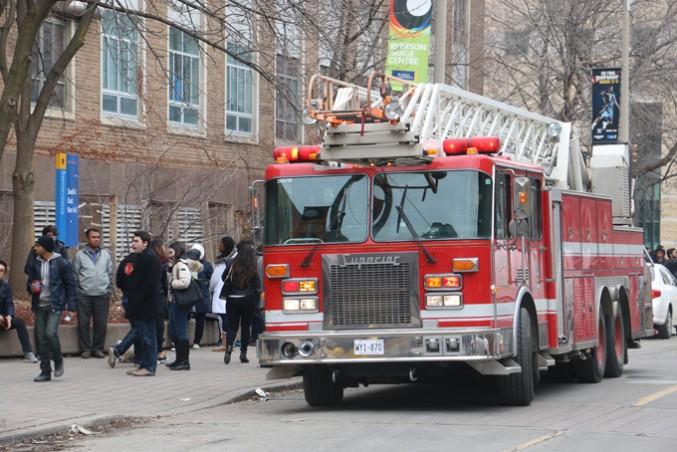By Allan Perkins
Last year, third-year aerospace engineering student Anojan Arara Salam was right in the middle of an exam. All of a sudden, the fire alarm went off.
Here’s the fun part: Arara Salam said he thinks someone may have pulled it.
“It wouldn’t surprise me if that happened,” he said. “I didn’t see any fl ames or smoke, so I’m pretty sure that’s what it was.”
If someone did end up pulling it, they did so about an hour and 20 minutes into a three-hour mechanisms and vibrations exam. If there was ever a time to pull a fi re alarm, it would be in a three-hour mechanisms and vibrations exam.
But incidents like this one still raise a pressing issue at Ryerson – too many fire alarms go off when there aren’t fires.
So far in 2015, it’s happened 20 times.
When it does, it costs the school money – $410 per vehicle per hour. Kerri Bailey, manager of finance and strategic planning at Ryerson, said in an email that the school had been invoiced for two false alarms so far this year. At three trucks each time, that cost Ryerson $2,460 in total, plus tax.
Bailey said that of those 18 additional false fire alarms, they have not yet been invoiced and cannot determine the exact costs, but that could change.
The charge only applies when the fire alarm is either triggered by malicious intent or by a maintenance issue, malicious being what may have happened in Arara Salam’s exam and maintenance being a whole lot of things to do with the building if they happen repeatedly. Steam continuously leaking from faulty pipes and triggering the alarm would be an example that would cost the school money. Human error where the alarm is accidentally triggered or kitchen errors like overcooking the roast beef are not charged.
“If we’re there three times in a day due to an issue that could be corrected, that’s a problem,” said Paul Versace, captain of the P325 truck at Toronto’s Regent Park fire headquarters.
Versace added that between three and four trucks are usually dispatched to Ryerson whenever they go there, which is more than the one or two trucks they usually send out.
He added that trucks come from separate stations – usually the closest three or four – to spread responsibility and avoid overwhelming one station’s resources.
That means that if Ryerson is hit with a malicious or maintenance false fire alarm charge, it could cost the school roughly as much as $1,600 in useless fees – each time.
First-year biomedical sciences student David Choi thinks it’s possible the same thing may have happened to him.
He was sitting in a first-year sociology class smack in the middle of last semester when it happened.
“Someone probably pulled it to get out of a midterm,” he said.
Students in Kerr Hall were sent outside for between 10 and 15 minutes, which may have been just enough time to postpone whatever midterm someone might have tried to avoid.
“False alarms caused by pull stations are by far the most common occurrence on campus, and often these spike during exam periods,” Bailey said in an email.
Exams are coming up soon. Recent trends indicate that Toronto Fire invoices could be as well.










Finley
Thats not a lot of money